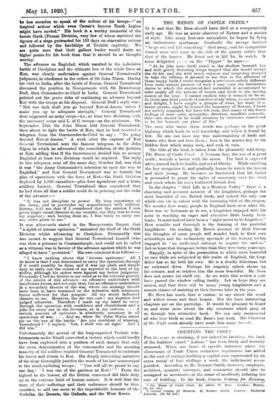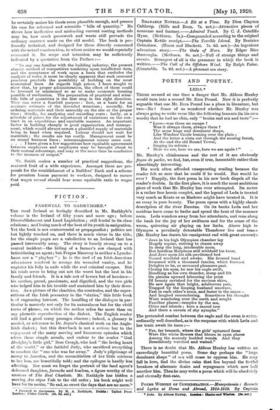COUNTING THE COST4 Fox its share in straining, if not
indeed in breaking, the back of the builders' camel " Labour " has been freely and severely censured. When one hears of specific instances where the observance of Trade Union restrictive regulations has added to the cost of cottage-building a capital sum represented by an extra rental of four shillings a week, the indictment seems justified. According to Mr. Sumner Smith, however, employer, architect, quantity surveyor, and contractor should also be arraigned as accessories in the crime of needlessly inflating the cost of building. In his book, Concise Costing for Housing,
• The Heron of Coale Creek. By Allred W. Item London : Murray. Ra. 6d. net.]
t Concise Costing for BOUINagl. By Sumner MAUL London : Technical Journals. 16a. 611. net.]
he certainly makes his thesis seem plausible enough, and presses his case for reformed and scientific "bills of quantity." He shows how ineffective and misleading current costing methods may be, how much guesswork and waste still pervade the ordinary contract made on the old model. The book is pro- fessedly technical, and designed for those directly concerned with the actual construction, to whose notice we would especially commend it. Its scope and intention may be sufficiently indicated by a quotation from the Preface :—
"To any one familiar with the building industry, the present chaotic method of competitive tendering upon insufficient data, and the acceptance of work upon a basis that excludes the analysis of costs, it must be clearly apparent that such unsound practices preclude the possibility of building on the most economical lines. As regards high prices, I have sought to show that, by proper administration, the effect of these could be lessened or minimized so as to make economic housing possible of realization. The preparation of practical and scien- tific bills of quantities is the first step in the right direction. They can serve a fourfold purpose : first, as a basis for an accurate estimate of the intended structure ; secondly, for ordering materials and their assembly on the site at the proper time • thirdly, for analysing and recording costs; lastly, as a schedule of prices for the adjustment of variations on the con- tract in an expeditious and equitable manner. An important factor in building cheaply is good organization and manage- ment, which would always ensure a plentiful supply of materials being to hand when required. Labour should not wait for materials ; the results are too costly. Management must be on sound business lines ; mismanagement means more cost. . . . I have given a few suggestions how equitable agreements between employers and employees may be brought about to their mutual advantage, and may at the same time be conducive to the increase of output."
Mr. Smith makes a number of practical suggestions, the matured fruit of a wide experience. Amongst these are pro- posals for the establishment of a Builders' Bank and a scheme for premium bonus payment to workers, designed to ensure that wages earned should bear some equitable ratio to wages paid.











































 Previous page
Previous page